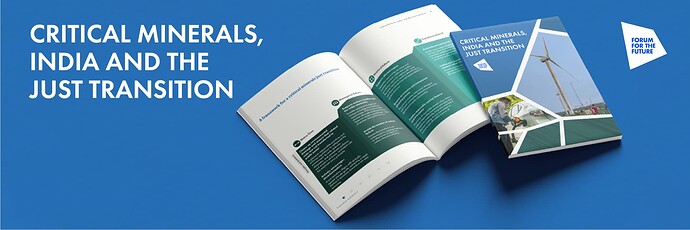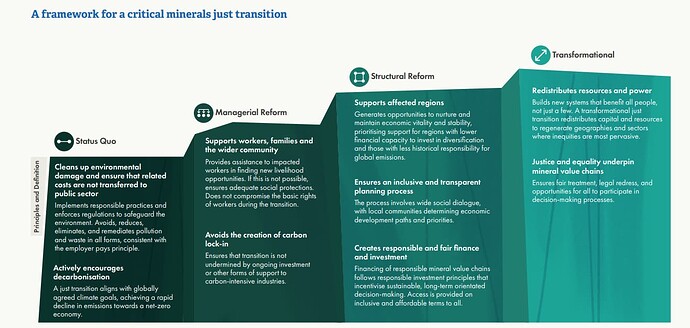Over the last 4 months we have prioritised engaging with our peers to gather feedback on our report and deepen relationships with civil society organisations, think tanks, and EV and wind sector actors active across India’s critical minerals landscape. This process has helped build a clearer picture of who is doing what, where, and with whom and has surfaced opportunities to align efforts. We are now beginning to shape a shared understanding of how we might work together more strategically and coherently to support a just and resilient energy transition in India.
On 23rd July 2025, we launched our report, Critical Minerals, India and the Just Transition. It offers a 4-step framework to investors, industry actors and policy makers to build resilient, socially just and ecologically positive critical minerals value chains. It focusses on supply chain decarbonisation, workforce resilience, mitigating geo-political risks, long-term community development, and transparency.
You can read the full report here.
The report presents the ambition and action on aligning the critical minerals value chains with the just energy transition as a spectrum, ranging from shallow, compliance-driven reform to deep, transformational change. It makes it clear that if we are to embed justice, equity, and regeneration at every level of India’s energy transition, addressing the appropriate critical minerals value chains is key.
Four levels of transition ambition
1. Status Quo – No change or minimal improvements.
2. Managerial Reform – Compliance with ESG norms and risk mitigation.
3. Structural Reform – Rebalancing value, power, and voice across the supply chain.
4. Transformational Change – Creating fundamentally regenerative systems that redistribute benefits, include all stakeholders, and prioritise long-term planetary and community health.
This report provides recommendations on what is needed to embed just transition principles in the critical minerals sector. These include:
-
Strengthening collaborative action to strengthen India’s ability to seize emerging opportunities, manage risks across the value chain, and build long-term foresight capabilities.
-
Developing a resilient and skilled workforce by investing in targeted training programs, enhancing the adaptive capacity of workers and communities, and supporting a vibrant MSME ecosystem to position India as a processing hub over the coming decades.
-
Integrating supply chain transparency and participatory governance by evolving regulatory frameworks, embracing participatory decision-making, and leveraging technology to enhance traceability and accountability.
-
Enabling businesses to embed sustainability beyond compliance by showcasing the value of ambitious, sustainability-driven strategies and deepening the understanding of environmental and social risks and opportunities across the supply chain.
-
Positioning the just transition as India’s competitive advantage by promoting sustainability as a driver for attracting responsible investment, leveraging blended finance to scale innovation and transparency, and establishing India as a global leader in socially and environmentally responsible financing for critical minerals
Key insights and learning:
-
Without action, the energy transition risks replicating many of the environmental and social harms of the fossil fuel-based system.
-
The Just Transition should be understood as a shift that can occur superficially, achieving unstable and insecure progress while the overall transition contributes to negative impacts, and it can occur deeply, in which equity, inclusivity and value are embedded, with positive impacts across social and environmental challenges.
-
There is a narrative that sustainability must wait for India to secure mineral supply and scale clean technology production before being integrated, however by embedding sustainability and a just transition, India can differentiate itself in the global market, meet a growing demand for traceable, environmentally safe minerals, and contribute to its own and global targets for climate and nature. Sustainability should be integrated immediately and consistently as industries are scaled.
-
Conversely, not embedding sustainability can lead to social and environmental harms, including civil protest and disobedience, water pollution, and loss of livelihoods. These have consequences for a company’s social license to operate as well as increased exposure to risk.
-
The existing civil society is beginning to coalesce. Effective convening and concerted collective action has the potential to influence and shape the growing clean technology industry in India and associated supply chain.
-
A key challenge for us has been limited private sector buy-in, driven by a lack of clarity on why a just transition approach is relevant to their work and what role they can play. This has made engagement inconsistent and required us to pivot our efforts toward building understanding and alignment with industry priorities.
Our current focus and next steps:
As our report recognises the need for coordinated civil society engagement in this space, we convened a closed-door workshop in Delhi on 21st April with leading CSOs and think tanks. The session fostered open dialogue, surfaced seven shared priorities including environmental and social impacts, policy influence, clean energy linkages, and global geopolitics and revealed strong interest in long-term, co-created, and action-oriented collaboration. As a next step, Forum will continue supporting this emerging ecosystem through further dialogue, joint research, and collaborative advocacy. We will also be joining and strengthening the efforts of the existing coalition 3C-SET to build momentum for a just and resilient critical minerals future for energy transition in India.
Our engagement with the private sector has surfaced a critical gap: the lack of a compelling business case for action towards the just energy transition in the critical minerals sector. There is insufficient robust evidence and a lack of clear articulations of the business risks of externalising environmental and social harms, and current narratives around externalities have not activated meaningful change within companies. To address this, we are adopting an iterative, action-sprint approach combining rapid research, testing, and feedback to identify and communicate social and environmental externalities in business models relating to critical minerals through means that encourage immediate and meaningful action to shift current practices.
In parallel, we are also scoping our approach to better understand the emerging trends, technologies, and skill gaps shaping the future of work in the critical minerals sector. This includes mapping the skills needed to support a just and future-fit transition and identifying opportunities for inclusive and resilient workforce development.

